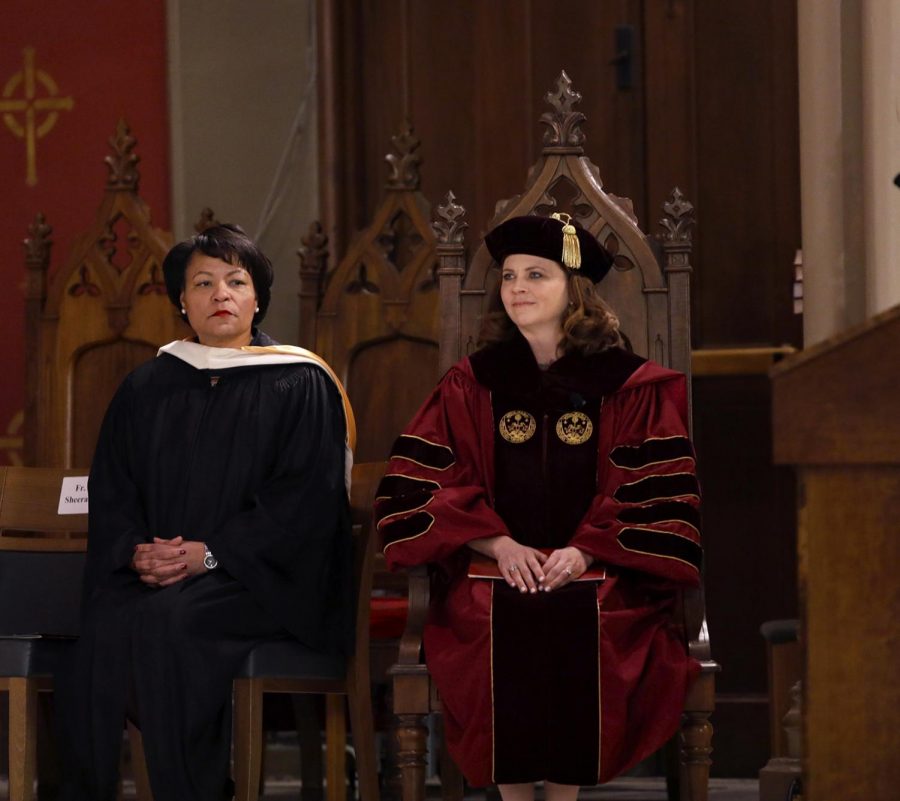Who runs New Orleans? Women.
University President Tania Tetlow and New Orleans Mayor LaToya Cantrell sit together during Tetlow’s inauguration on November 16, 2018. Cantrell and Tetlow both took over two of the most prominent positions in New Orleans. Angelo Imbraguglio/The Maroon
August 16, 2019
In 2018, New Orleans saw three women ascend to some of the most prominent positions in the community: positions that had historically only been held by men.
The first occurred due to the passing of then New Orleans Saints and New Orleans Pelicans owner Tom Benson in March 2018. Upon his death, his wife Gayle Benson assumed the role of heading the two teams as well as a number of other local businesses.
Close after, in May 2018, LaToya Cantrell was inaugurated and assumed the office of the mayor following her victory in her runoff against Desiree Charbonnet.
Finally in May 2018, Loyola University announced that the selection Tania Tetlow to replace the Rev. Kevin Wildes, S.J. as university president.
These three women are now some of the most prominent leaders in the city. In their own words, each woman shattered barriers and faced challenges while adjusting to their new positions.
Tania Tetlow
When Tania Tetlow took over as university president earlier this year, she became the first woman and the first layperson to occupy the role in Loyola’s 115 years.
She said her upbringing, in a family filled with Jesuits, a theologian mother and a family full of Loyola community members, helped her prepare for the role.
“It just felt like all of the odd parts of my training perfectly suited me to this one job,” Tetlow said.
Tetlow’s first foray into leadership was in student organizations as an undergraduate. However, she also pinpointed one aspect of her childhood that helped her grow as a leader.
“I think in some ways I suffer from being an only child who wanted to tell my sisters what to do,” Tetlow said about her solo upbringing.
She said she felt a responsibility to implement ideas to make the world fairer.
Tetlow made her way to higher education after a career as a lawyer. The former federal prosecutor said some people underestimated her assuming she was young and inexperienced because she was a woman, but “much to their peril.”
She instead made sure to use it to her advantage. As a young lawyer, she deposed a corporate president who misjudged her.
“The witness just thought I was adorable and did not at all take me seriously and I got him to admit some amazing facts in the deposition because he just wasn’t paying attention,” she said.
Leadership did not all come easily however. Tetlow said she had “so many” failures she learned from along the way.
“You learn the most when you make mistakes and fail, because when you succeed you are never quite sure why,” Tetlow said.
One challenge Tetlow faced early in her new position was making sure to uphold the university’s Jesuit identity. She said she felt that it was more significant being the first layperson who assumed the office, rather than being the first woman.
Tetlow credited the community of Jesuit priests for helping to ease the transition. As Jesuit numbers decreased, Tetlow said the priests made clear to the community that Tetlow taking over despite being a layperson was “an inevitable and important transition with some opportunities as well.”
Tetlow joined Loyola during a time of upheaval as the university had significantly tightened the budget after running a deficit. She granted that the really hard work happened before she started, but Tetlow has faced challenges like enforcing the balanced budget.
She said she had “cautious optimism” about the university’s financial situation going forward. But despite the troubles, she said she has felt a lot of support for being the first female president at Loyola.
“For every person who can’t quite picture a woman in charge, there are three others who are excited at the change that represents,” Tetlow said.
Gayle Benson
Gayle Benson says business is all about the people.
Before she met her famous husband, Tom Benson, she started her business career at an interior design firm. She said she utilizes the lessons she learned there still today.
“In my design business, it was all about the people. But when you transfer it over to the football and basketball, it’s all about the fans, and as long as you can keep people happy, meaning your fans, then I think you can be very successful,” Benson said.
Benson inherited ownership of the New Orleans athletic teams, as well as other businesses like Dixie Beer and several car dealerships, in March 2018. In doing so, she became the only female owner of two major professional sports franchises and one of the most powerful women in sports.
As she assumed control, the Saints came off an 11-5 season before losing to the Vikings in the divisional round. Meanwhile, the Pelicans were in the midst of one of their most successful seasons in recent years, advancing to the playoffs before falling to the Golden State Warriors.
But despite the good will, Benson’s first full seasons with the team would be filled with drama. While the Saints advanced all the way to the NFC championship game, the season would end in controversy after a widely-opposed no-call on pass interference by the Los Angeles Rams.
Meanwhile, the Pelicans’ season erupted into a media circus following star Anthony Davis’ trade request mid-season.
Following the season, Benson and the organization made serious changes in the Pelicans’ operations. General Manager Dell Demps was fired and Executive Vice President Mickey Loomis, who had previously overseen both the Saints and the Pelicans, was moved to focus entirely on football.
Benson said the organization is like a family, but even so, she is willing to make tough choices.
“Anybody that comes to work here knows they need to perform and if they perform, they are going to be here for a long time,” Benson said. “But, it’s like in any other business if they don’t perform, no matter who you work for, that’s the way it goes.”
Benson said that every day in business is a new lesson and didn’t understate the value of failure.
“You make mistakes as you go along and you learn through those. You lose games and you figure out why you lose games and you learn from them,” Benson said.
Benson said she hopes to leave a positive legacy for New Orleans.
“I just try to do the best I can every day and work hard every day and do whatever I can to leave something better than I found it when I got here,” she said. “After I’m gone, I hope I’ll leave everything in a better spot.”
LaToya Cantrell
LaToya Cantrell did not run for mayor with the idea of being New Orleans’ first female mayor. But, she certainly felt some satisfaction in doing so.
“I have to say, being elected and being in this role that comes with being the first female executive in our city in 300 years, it’s really knowing that I won’t be the last. That’s the most gratifying,” Cantrell said.
Cantrell said she learned leadership lessons in organizing, listening to and educating the community from her time on city council and her time as president of the Broadmoor Improvement Association.
Cantrell gave an example of some of the successes she has seen during her year and a half in charge. Initially told that the city would be unable to rededicate a portion of the hospitality tax revenue toward infrastructure, Cantrell and her team worked to listen to the people affected and provide education.
“As a result, we moved from a no to yes,” Cantrell said.
Cantrell took lessons from previous work in a legislative capacity, but cited the differences the position had with her experience as mayor.
“I cannot get caught up in the rhetoric. I have to get caught up in solutions and actually get things done,” she said. “So, no longer a spectator, I’m in the middle of the arena.”
Cantrell emphasized that the community informs her decision-making and that the people will make clear what their priorities are. She noted the importance of garnering people’s support to accomplish her objectives.
“You’ll win some and you won’t, but if it’s a focus and a thing that people want, then that gives me the ingredients to move forward because I’m pushing from what they want,” Cantrell said.
Cantrell said she hopes to show for future female leaders the different roles women can play.
“I think it showcases that women can not only be great legislators, but damn good executives.”Cantrell said she learned leadership lessons in organizing, listening to and educating the community from her time on City Council and her time as president of the Broadmoor Improvement Association.
Cantrell gave an example of some of the successes she has seen during her year and a half in charge. Initially told that the city would be unable to rededicate a portion of the hospitality tax revenue toward infrastructure, Cantrell and her team worked to listen to the people affected and provide education.
“As a result, we moved from a no to yes,” Cantrell said.
Cantrell took lessons from previous work in a legislative capacity, but cited the differences the position had with her experience as mayor.
“I cannot get caught up in the rhetoric. I have to get caught up in solutions and actually get things done,” she said. “So, no longer a spectator, I’m in the middle of the arena.”
Cantrell emphasized that the community informs her decision-making and that the people will make clear what their priorities are. She noted the importance of garnering people’s support in order for her to accomplish her objectives.
“You’ll win some and you won’t, but if it’s a focus and a thing that people want, then that gives me the ingredients to move forward because I’m pushing from what they want,” Cantrell said.
Cantrell said she hopes to show for future female leaders the different roles women can play.
“I think it showcases that women can not only be great legislators, but damn good executives.”








